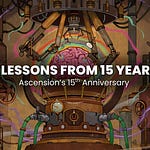About Richard Bartle & Nigel Roberts
Richard Bartle and Nigel Roberts join us on today’s episode, bringing decades of experience in gaming, technology, and community building. Richard is one of the co-creators of MUD (Multi-User Dungeon), the precursor to today’s MMORPGs, and developed the famous Bartle Taxonomy, which categorizes player types. He’s also a renowned author and academic, with works like How to Be a God exploring virtual worlds.
Nigel Roberts, one of Richard’s long-time collaborators, was involved in the development of MUD and has had a significant role in shaping the modern internet. He is a member of the ICANN Board of Directors and one of the founders of the .gg domain. Nigel also made history as the first person to win a lawsuit in the UK for unsolicited spam email. His legal and technical insights have been instrumental in building communities both online and in the gaming world.
In this episode, Richard and Nigel share their journey from developing the earliest multiplayer games to navigating the challenges of decentralized systems, community regulation, and virtual economies. They also discuss the power of “what if” in game design, the hero’s journey, and how both players and designers can express freedom and identity through games. Enjoy!
Check out the previous episode with Richard Bartle:
Want to support the podcast and get more design lessons?
Paying subscribers enjoy an abundance of extra game design content and an exclusive newsletter with new lessons, archive access, videos, and more! By opting for a free or paid subscription, you can get the latest articles delivered to your inbox and support this podcast!
Ah-ha! Justin’s Takeaways
The Power of ‘What If’ Thinking: Nigel’s simple question—“What if we could have multiple players in the same dungeon?”—led to the creation of MUDs and multiplayer gaming as we know it today. This highlights the incredible importance of encouraging “what if” thinking in game design. It constantly reminds me to challenge assumptions to allow space for innovation.
Freedom and Self-Expression in Games: Richard’s idea that MUD was designed to give players the freedom to be who they want to be deeply resonates with me. I'm continually thinking about the ability for games to offer safe spaces for players to explore their identities as we design new experiences. It’s a powerful reminder that games are more than just mechanics—they are platforms for personal expression.
Decentralization and Its Challenges: I'll take Richard’s caution about decentralized systems being difficult to control once they’re in place to heart. While decentralized economies and systems offer exciting possibilities for player freedom and innovation, this conversation reinforced the need to ensure that game designers retain the ability to adapt and effectively guide the direction of their games.
Show Notes
“What if you could have more than one person in the dungeon at the same time?” (00:06:32)
Nigel shares the pivotal moment when he asked the question that led to the creation of MUD, the first multi-user dungeon game—this moment sparked the development of multiplayer games, transforming the gaming industry. The lesson here is the power of the "what if" mindset in sparking innovation and breaking from established norms.
“You have the freedom to be who you want to be.” (00:16:17)
Richard explains how MUD was designed to allow players the freedom to explore their identities in virtual worlds, offering a level of self-expression that wasn’t possible in the real world. This freedom to explore different personas is most obvious in role-playing games but can be seen to some extent in nearly all games.
“So there isn't just a binary, it's safe, or it's not. It's whether it's within your parameters of being safe for you. Now, there are some levels at which society would want to step in and say, this isn't safe for society.” (00:26:58)
Nigel discusses how the internet has expanded the concept of communities, enabling positive and negative groups to form and thrive. This insight highlights the need for thoughtful community design and regulation to foster positive, healthy environments, particularly in online games.
“Decentralization is fine until you want to change the rules.” (00:40:23)
Richard shares his thoughts on decentralized game economies and the potential pitfalls of blockchain-based systems. He explains that while decentralization offers certain freedoms, it can limit the ability of game designers to adapt and make necessary changes, illustrating the balance between freedom and control in game development.














